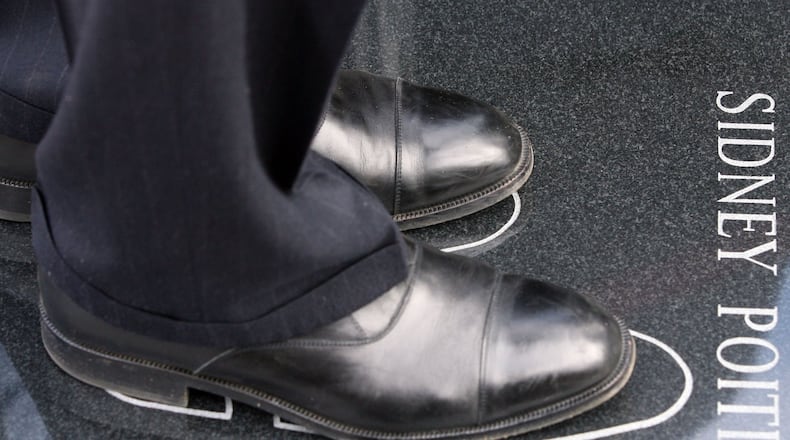The Rev. C.T. Vivian, a lion of the civil rights movement, was overjoyed and filled with laughter.
Famed actor and director Sidney Poitier was brought to tears.
Claudia “Lady Bird” Johnson, a former first lady, though ailing, immediately directed a staffer to send a pair of her husband’s shoes to Atlanta.
All are part of an outdoor exhibit called the International Civil Rights Walk of Fame that — literally — allows people to walk in the footsteps of those who played a role in the fight for justice and equality.
For years, the exhibit has been at the Martin Luther King Jr. National Historical Park’s Visitor Center, run by the National Park Service.
Soon, though, the exhibit’s permanent home will be nearby at the National Center for Civil and Human Rights in downtown Atlanta. Replicas of the nearly 50 pairs of footprints will be installed on the Ivan Allen Jr. Boulevard side of the center with more to come.
“These are real people who made a real difference in the world, and this should be shared with a larger audience,” said creator Xernona Clayton, who is also founder of the Trumpet Awards Foundation and a civil rights activist.
A major ceremony marking the new location of the International Civil Rights Walk of Fame will be held May 16 at the National Center for Civil and Human Rights. The public is invited to attend.
Fifteen pairs of footprints will be reproduced in the first phase with four new additions.
New inductees are Jan Prisby Bryson, president of BenchMark Management, an engineering, construction and program management services firm; Thomas W. Dortch Jr., entrepreneur and national chairman of the 100 Black Men of America; Monica Kaufman Pearson, well-known broadcast journalist; and Sir Franklyn R. Wilson, a Bahamian businessman.
The Auburn Avenue site gets about 800,000 visitors annually, said Rebecca Karcher, chief of interpretation, education and cultural resource management.
The footprints tell the story of those who fought for the civil rights movement, so whether they’re at the King historic site or at the National Center for Civil and Human Rights doesn’t matter, she said.
“That’s fine as long as the story is being told,” she said.
>> RELATED: 5 Atlanta streets named after civil rights activists
Clayton said the new location has been in the works for a while, but was put on hold as she waited for the center to be built and because of costs. She said each installation, set in a special concrete mixture, costs about $3,000.
She said the decision was made to keep the initial exhibit at the Auburn Avenue spot because it would cost more to remove than to just create replicas along Ivan Allen Jr. Boulevard.
The National Center for Civil and Human Rights gets about 200,000 visitors a year, but millions visit the area that houses the center, the Georgia Aquarium, Centennial Olympic Park and the World of Coca-Cola annually, said Jill Savitt, CEO of the center.
“What I love about it is that you won’t have to pay admission to any facility to see the exhibit,” she said. It will be set in a path that lines up along the edge of the building. At some point, there is talk of getting permission from the city to use sidewalk space.
“Having this exhibit of the civil rights movement is a big deal,” she said. “We are almost literally asking you to walk in the footsteps of people who have done so much in the civil rights movement and continue to do so.”
That was a big selling point for Clayton, who said the exhibit will get more exposure.
Overall, more than 100 people have been inducted though not everyone has a footprint display, yet.
She said she has been in contact with former President Barack Obama to include his shoes as well. “The president wants to be here in person,” she said. “We’re trying to arrange a time and formal induction.”
RELATED: Foundation buys King's Vine City home, will be open to the public
All of the shoes have been saved and have been included in a tour before.
Clayton has fond memories of many of the people who have had their footprints made.
Poitier, for instance, became very emotional when he stepped into his own footprints.
“He said these are tears of joy,” said Clayton. “I want you to know that when I stand here, I realize that my footprint will be here forever. It does something inside your heart. Children will stand here in your footprints and try to emulate the life you tried to live. This is longevity.”
Johnson, the wife of former U.S. President Lyndon B. Johnson, had recently suffered a debilitating stroke when she was approached about the project. Her assistant called Clayton to say Johnson had tears in her eyes. (Johnson died in 1973, and his wife died in 2007.)
“She said everyone knew her husband was president,” Clayton said, “but not everyone knew he signed the Civil Rights Act (in 1964) — that he had done the right thing as president.”
EVENT PREVIEW
The ribbon-cutting ceremony will begin with breakfast at 8:30 a.m. May 16 at the National Center for Civil and Human Rights, 100 Ivan Allen Jr. Blvd NW, Atlanta. Tickets are $45 and can be purchased in advance by calling 404-878-6738 or 678-296-3920. Tickets will also be available the morning of the ceremony.
About the Author
The Latest
Featured


